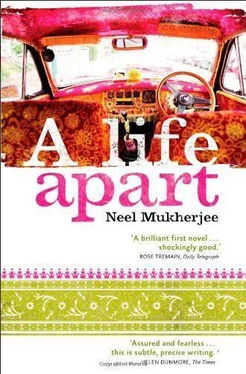The next day, during visiting hours, he took the lift high up to his mother’s room. She seemed conscious, her eyes opening wide as if she had just woken up from a long sleep and was having considerable trouble easing herself into the unfamiliarity surrounding her; the world of her sleep still inflected the hospital room. She struggled to get up, looked at her son, and said, ‘Home, I want to go home. Why am I here? What is this place?’
Ritwik answered, ‘Yes, of course, you’ll go home, but you’re not very well at the moment, Ma. As soon as you’re better, we’re going to take you home.’ He spoke very slowly, articulating each word separately and distinctly, as if he was simplifying something complex to an inquisitive child.
Buffeted by some barely articulable unease, she tried to raise her head against the pillows again. She looked like a strung-up marionette that hadn’t quite come to fluid and easy life because the puppeteer had only just begun and was going through his hand and finger warming-up exercises. One of the monitors attached to her showed a jagged green graph, like a curious, moving snake, forming and reforming, arcanely measuring out her life in electronic signals.
Ritwik, remembering what the doctor had said about extensive damage to the brain, asked her, ‘Can you recognize me? Who am I?’
She answered him correctly, an emptiness in her face, perhaps trying to work out if it was a trick question, but the look of blank confusion could equally have been the effect of the stroke.
She tried to lift her hands, in an eerily lost movement, as if they had acquired an unmoored yet independent life, no longer governed by the directing brain. The words came out truncated and random, ‘Pain, headache. Here, here, no here’ — her hands, nowhere near her head, flailed about, unsuccessfully trying to locate the exact spot — ‘please massage my head, it’ll go away. Just a headache. And then you’ll take me home.’
Her eyes were wide and unfocused; they didn’t seem to be registering anything.
Ritwik had to find out if her ability to perceive and recognize objects had been impaired as well. From his sidebag, he took out the book he was currently reading — The Complete Illustrated Nonsense of Edward Lear — held it in front of him and asked, ‘Ma, can you tell me what I’m holding in my hands?’
She rolled her eyes towards him but didn’t manage to fix them either on him or on the book. ‘Book, a book’, the words tumbled out like an erratic spill of oranges from a paper bag. ‘Why are you asking me these questions? If you press your hands on my head, head, here, here’ — this time she didn’t even manage to raise her arms — ‘it’ll go, really, it will.’
He said, ‘The doctor will make it go away. You’re in good hands.’ The lie jangled so shrilly in his ears he looked up to see if she had heard it.
She had shut her eyes and was mumbling, ‘Like you used to massage my temples, forehead, with Amrutanjan when I had headaches, like that, it’ll go away. When you were young. It’s a very severe headache, you know?’
He felt as if something had gone through the centre of his torso, entering through his navel and boring its way out back through the spine. The duty nurse came in and saved him. ‘All right, that’s enough. You mustn’t tire her out.’
Ritwik stood up to leave with his back turned to the bed. He couldn’t bear to look at the bloodless face of his mother already asleep — or was it comatose? — on the regulation pillows but the need to twist the knife proved too strong. He turned around and a careless calculation, done god knows when, hiding and waiting until this moment for the ruthless ambush, tripped up his entire being: she had been four years older than he was now when she had given birth to him. He gripped the metal rail at the end of her bed and swallowed. When had his own span of life, one he had thought so small that it could be counted, almost totally, on the digits of one outstretched hand, become so large that half his mother’s could be circumscribed within it? Half a lifetime, a midpoint reached with his birth: how could time be calibrated with such erratic abandon?
That night he slept in the flat of Aritra’s college friend, Sujoy. It was a convenient distance from the hospital and near-strangers offered both anonymity and a hiatus from the pinning focus of searchers looking for information, signs of grief, points of breakage. He was tired but did not want to be subjected to the ruthless time between switching off the light and the tricky oblivion of sleep, so he forced his attention on his Edward Lear.
He didn’t know what woke him up in the middle of the night. His mouth was dry, his throat a sore, raspy burn. Did she wake up as well, in an alien, clinical bed, her mind alert and ranging over things with the dreamlike clarity that colours such hours? Was she afraid? Did she think she was going to die? What did it feel like? Did she call out for him, her strangled cry bounding and rebounding off the insulated dark walls, or faintly leaking and petering out in the lowly lit corridors? Did she think of his father’s death or her own?
The next morning, the inevitability of going to the hospital gave him a sense of doom that seemed to drag and dredge inside him. There were people there already, his friends from college, and Aritra’s, who had offered to do the early morning shift. It was like a vigil, he thought, as he went to shoulder his time. Something in the shadows of Arpit’s face while he crossed the main hall already told him. Certain floating pieces of signs and sense, unconnected until now, suddenly came together in a confirmed design, a design he had always known would be, must be, as Arpit said in his infinitely rehearsed ‘thus you break the bad news’ voice that his mother had ‘expired’ in the early hours of the morning.
‘Expired,’ Ritwik thought, ‘what an improbable word to use.’ He nodded almost imperceptibly, acknowledging the news. Inside him was a breathless hollow, at once spiky and porous, awl-and-threaded through with the fibres of his very soul it seemed; it could have accommodated entire other worlds, other times.
Giving Arpit and others the slip, he went up to his mother’s hospital eyrie, perched so safe and high above the torrent of the city, to see what she looked like in death. He wanted to be alone, at least for this first view of his dead mother. A pale face in all its waxy coldness, lips with the pallor of ash, eyes shut: it could have been a deeply sleeping face that rested against the pillows. How could they be so sure that all the beating, breathing, painful life had left that face? He thought he was going to reach out his hand and touch it but couldn’t bring himself to move even an inch.
And here the gratuitous tyranny of memory seized him by the balls and no place, no time was safe, and he was a mere nothing to that event he had never, never thought about, never remembered, till now it was everything. He is four years old, and he and his mother board a hand-pulled rickshaw in Park Circus, on a road adjacent to the west side of the big circus green. Even now he feels that momentary precariousness of his position in the slightly scary rickshaw, as if he is about to fall backwards as the puller lifts up the front of the vehicle and the world tilts around him. Suddenly in front of them, in the middle air, there is a whole colony of blue and water-green dragonflies, circling and hovering in their staccato way, sometimes still in the air with just a vibration of wings, a static thrumming, and then off again with a jerky move. Ma, Ma, look, look, dragonflies! What a lot of them! What are they doing there? Why aren’t they landing on something? That suspension of a large swarm a cause of wonder and his mother with an explanation for a small child: They have just been born, up in the heavens, and have been sent down to earth right now , as if heaven were up above behind the canopy of the blue sky, the dragonflies shimmering their papery net-wings, a dazzling whirr in the clear light, having just pierced the blue screen above in their birth and descent. The little boy is delighted at the miracle and his eyes widen with wonder and happiness as his mother smiles and smiles at this benediction of air.
Читать дальше












